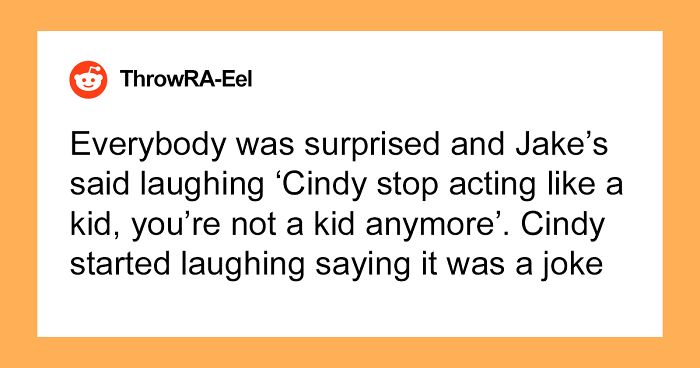
Woman Is Uncomfortable With 18 Y.O. Guest “Making Passes” At Her Husband
Interview With ExpertBuilding a relationship with the opposite sex can be an enriching experience. It offers a fresh perspective on various aspects of life and provides support that friends of the same gender typically can’t. However, for some, the thought of their partner having such a relationship can be unnerving.
For a long time, reditor ThrowRA-Eel wasn’t worried about her husband Jake and his best friend’s sister, Cindy, being close. Until one night, when she was visiting them and got way too comfortable with him. The wife felt so disrespected that she fled to her friend’s house, promising to come back only after Cindy had left.
Scroll down to find the full story and a conversation with psychologist and relationship expert Shaurya Gahlawatand licensed clinical psychologist Dr. Isabelle Morley, who kindly agreed to tell us more about opposite-sex friendships.
Building a relationship with the opposite sex can be an enriching experience
Image credits: cottonbro studio (not the actual photo)
However, this female friend got too comfortable with a married man and even sat on his lap in front of his wife
Image credits: Andrea Piacquadio (not the actual photo)
Image credits: Kristine javashvili (not the actual photo)
Image credits: cottonbro studio (not the actual photo)
Image source: ThrowRA-Eel
Men and women can be friends, according to psychologists
Such unfortunate situations as redditor’s ThrowRA-Eel prompt the question: Can men and women really be friends? Bored Panda reached out to psychologist and relationship expert Shaurya Gahlawat and licensed clinical psychologist Dr. Isabelle Morley, who kindly agreed to answer this question.
Both specialists agree that individuals of opposite genders can be just companions. In fact, many of Gahlawat’s clients have maintained such platonic friendships successfully. “For example, one of my clients shared with me about her close friendship with her male coworker. Despite being of different genders, they share common interests, mutual respect, and clear boundaries, allowing them to enjoy a supportive and enriching friendship without any romantic entanglements.”
Morley seconds this and draws our attention to the lack of portrayals of this on television or even in our own lives, as there’s a rooted myth in our society that persuades us to believe that any friendship between male and female leads to romance. “Which is unfortunate since people are missing out on many possible wonderful friendships as a result,” she adds.
However, as she notes, a man and a woman can develop stronger feelings down the road, which can be confusing or difficult, especially if they’re already committed to another person. Morley believes that one of the main warning signs that an opposite-sex friend might be crossing into romantic territory is when that friend becomes your partner’s go-to person. This means that the partner goes to their friend for emotional support, spends most of their free time with them, and shares their biggest hopes and dreams.
She further explains, “Although friends can be an outlet for those things, and it’s good and healthy to confide and have fun with friends, a romantic partner should be the primary person for those disclosures and quality time. If your partner is going to their friend to get many (or their most important) needs met, it might signal there’s an emotional disconnection or distance in your relationship that needs to be addressed.”
Another very strong indicator is if the significant other voices their concerns about how close they’re getting to their companion and makes reasonable requests to address this, and the partner refuses to hear them out. “If they’re defending their friendship while refusing to hear you out about your concerns, there’s a chance the emotional connection of the friendship is now stronger or more important than the one in your relationship,” she says.
Discussions about opposite-sex friendships should be navigated with openness and empathy
Through therapy, Gahlawat has guided couples to navigate discussions about opposite-sex friendships with openness and empathy. By creating a safe space for dialogue and exploring each other’s perspectives, they can identify their concerns and collaboratively establish boundaries that respect their needs and the integrity of their relationship.
To communicate concerns respectfully, she recommends choosing the right time and place for the conversation, ensuring privacy, and minimizing distractions. As well as expressing feelings using “I” statements to avoid blaming or accusing the partner and listening actively and empathetically to the partner’s perspective, validating their feelings and experiences. She also notes that it’s important to reassure the partner of your commitment to the relationship and your willingness to address any concerns together.
In the midst of this, Morley emphasizes that couples need to remember that friendships are important too. “People can’t only be friends with their partner, so embrace the fact that your partner has friends (even if they’re of the opposite sex). Next, couples should remember that they cannot and should not control their partner’s other relationships. While they may have very understandable concerns with a friendship, which they should voice, they shouldn’t feel entitled to dictate what their partner does in their friendships.”
When addressing such concerns, the partner should make it clear that they’re not trying to take such a valuable friendship away. Afterward, they can start explaining what’s making them feel uncomfortable. For instance, “Something like, “I’m uncomfortable with how often you text, sometimes I feel like I’m not even in the room when I talk to you, but you don’t answer because you’re messaging them instead, and I feel unimportant to you,” does the trick.”
She further explains, “Then offer a solution for what you think could work, while inviting them to share their thoughts and ideas, too. Remember, if their friendship isn’t crossing major lines, the goal isn’t to get rid of this friend; the goal is to find a way to integrate them into your life so that you don’t feel upset by their presence.”
Commenters also called out Cindy’s inappropriate behavior
Poll Question
Thanks! Check out the results:
Coda: in an update, MIL came over and ripped her son a new one, they discovered that Cindy had also lied to another person at the party trying to make the OP look both insecure and historically slutty, OP’s husband did say that he’d felt bad at the time and ever since, and OP & husband have gone NC with Cindy. MIL also had a long private talk with OP reassuring her that she’ll always have her back. (I’m retired & read Reddit a lot).
Pretty good update 2 on the actual Reddit post. Sounds like her hubby really isn't so bad and that she has an awesome, loving, and supportive mother in law as well
For those who may want to read it https://www.reddit.com/r/AITAH/comments/1bbcxyi/aita_for_leaving_a_dinner_party_after_a_girl_sat/
Load More Replies...Coda: in an update, MIL came over and ripped her son a new one, they discovered that Cindy had also lied to another person at the party trying to make the OP look both insecure and historically slutty, OP’s husband did say that he’d felt bad at the time and ever since, and OP & husband have gone NC with Cindy. MIL also had a long private talk with OP reassuring her that she’ll always have her back. (I’m retired & read Reddit a lot).
Pretty good update 2 on the actual Reddit post. Sounds like her hubby really isn't so bad and that she has an awesome, loving, and supportive mother in law as well
For those who may want to read it https://www.reddit.com/r/AITAH/comments/1bbcxyi/aita_for_leaving_a_dinner_party_after_a_girl_sat/
Load More Replies...
 Dark Mode
Dark Mode 

 No fees, cancel anytime
No fees, cancel anytime 








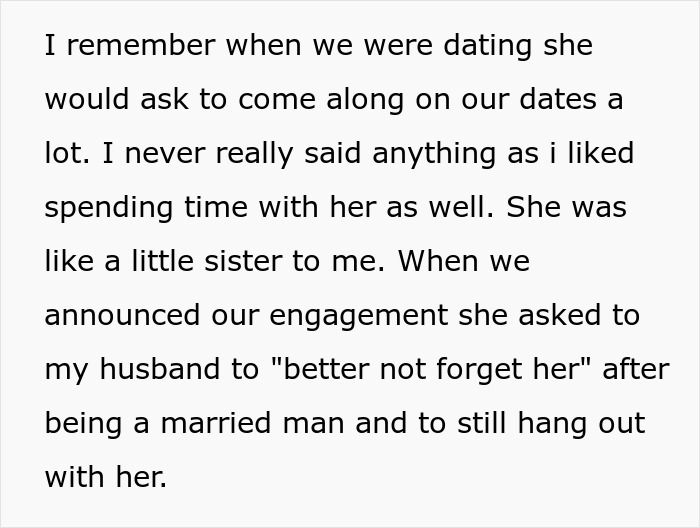








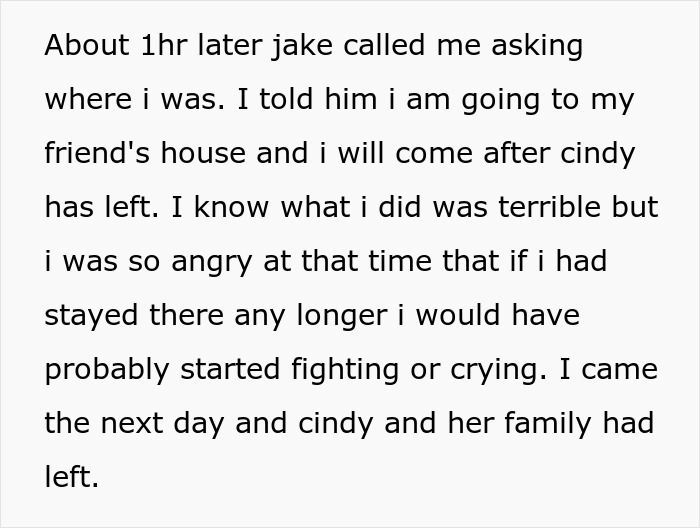


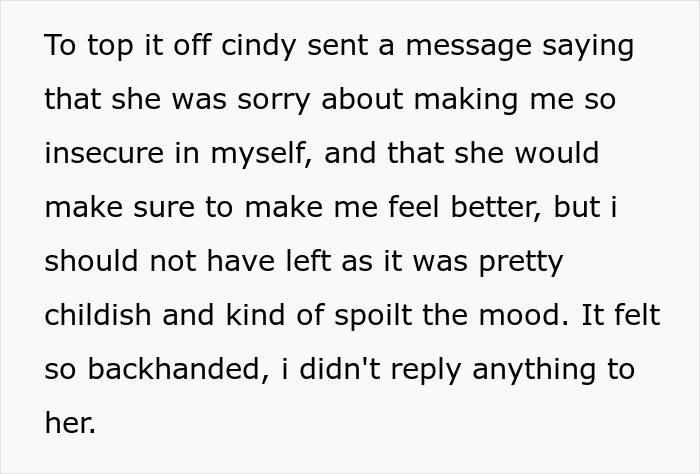
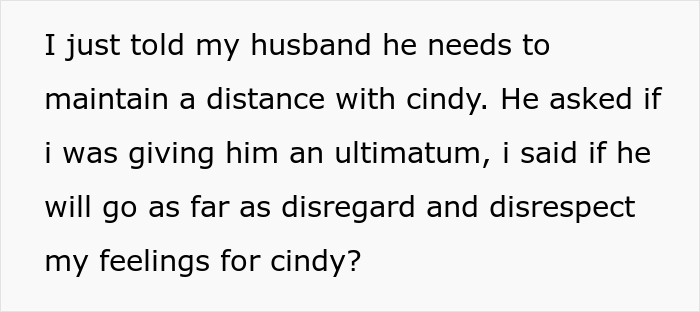
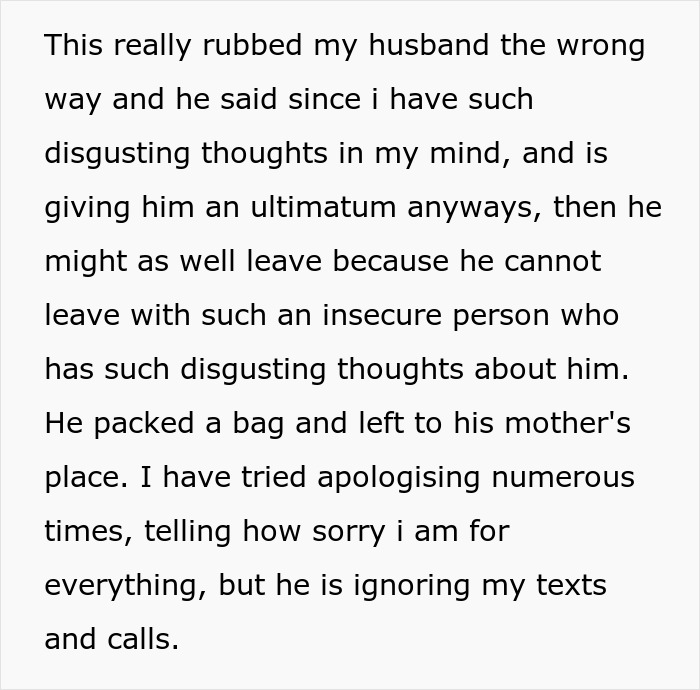
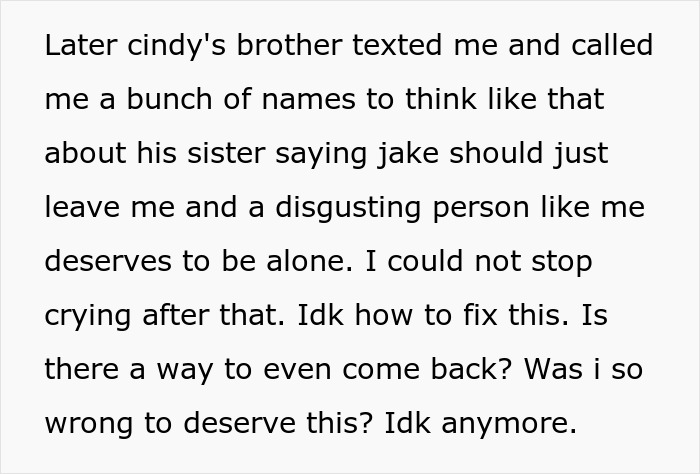

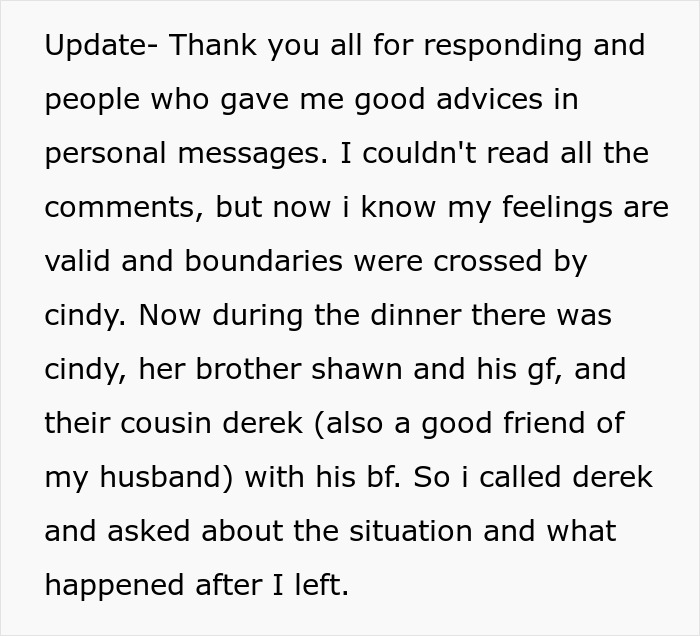









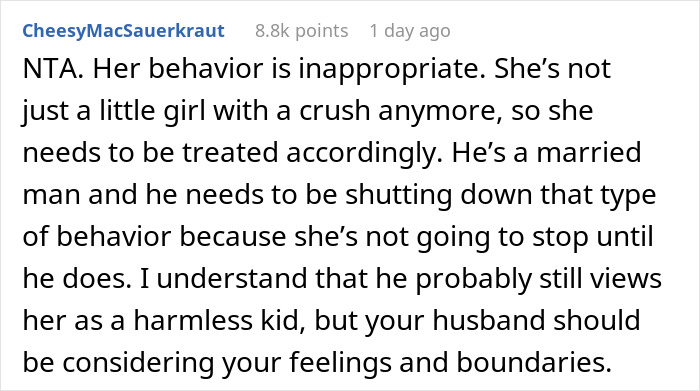



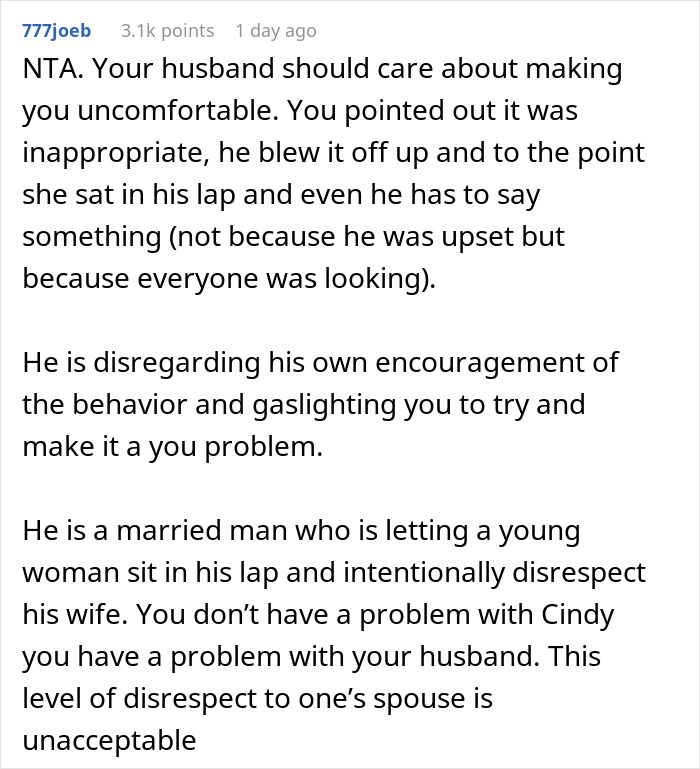




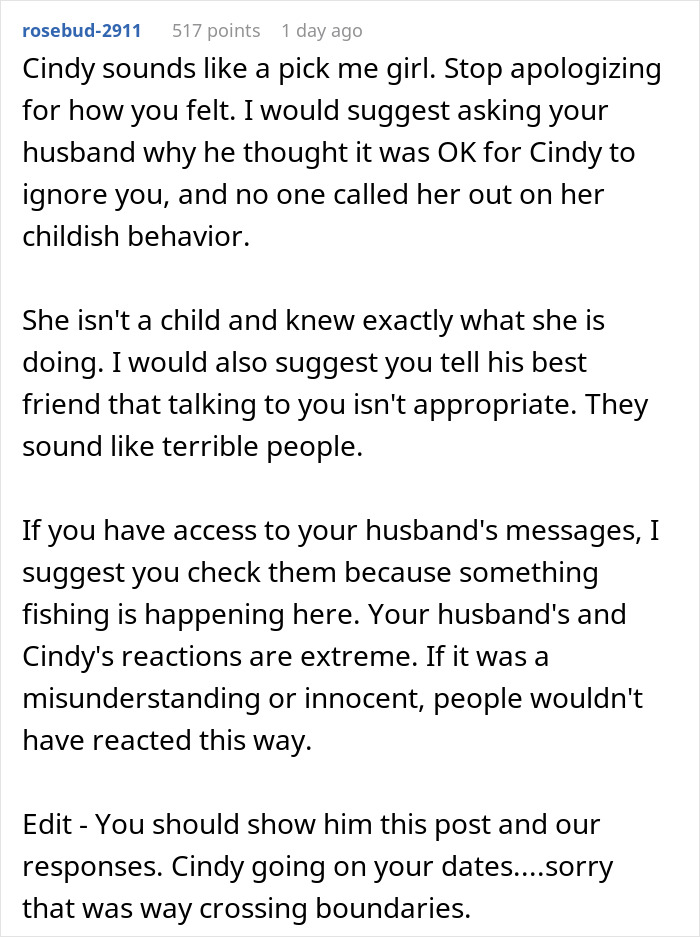


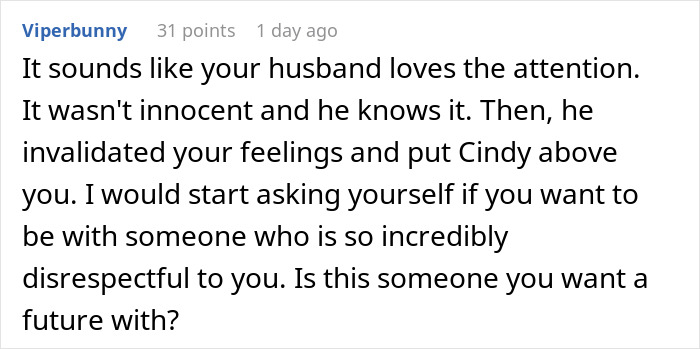












































46
42